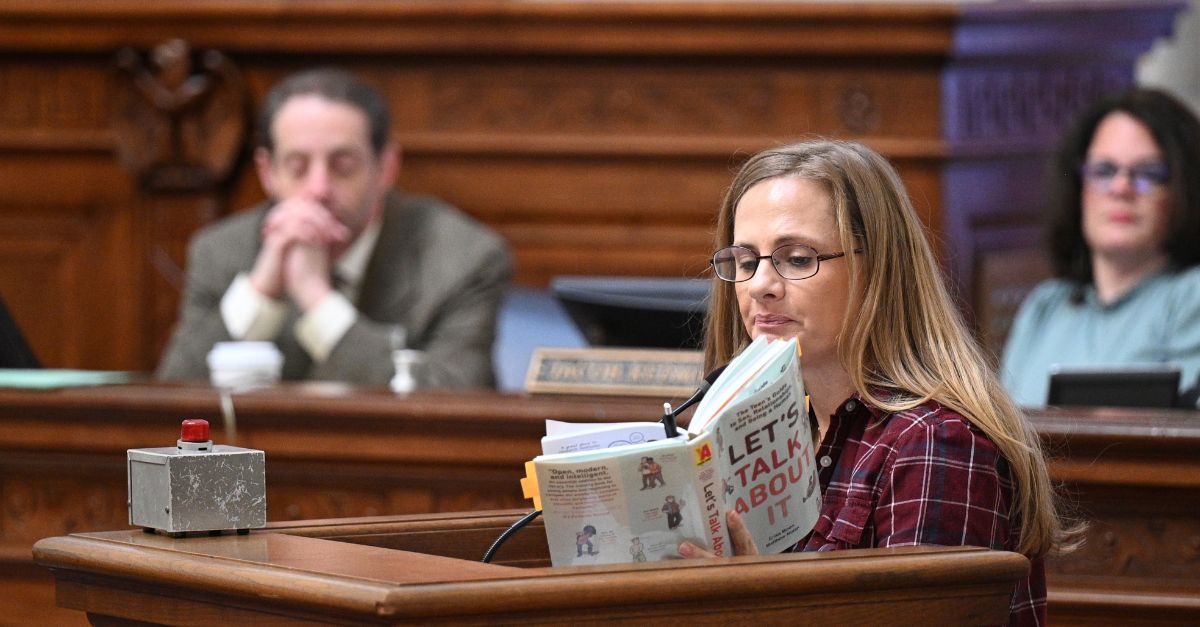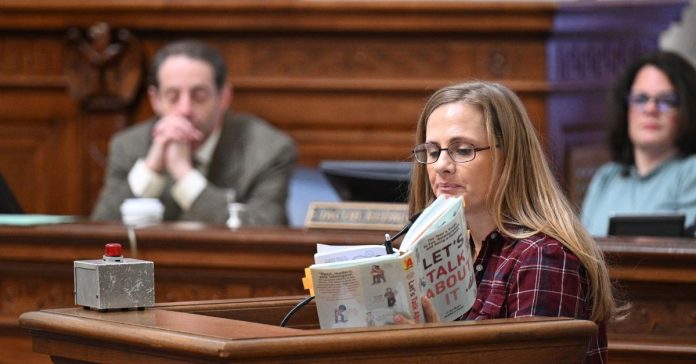
Jessica Rowley holds up the book “Let’s Talk About it: The Teen’s Guide to Sex, Relationships and Being Human” as an example of obscene material that should not be legally protected by public libraries and schools during a public hearing on proposed obscenity legislation at the West Virginia State Capitol in Charleston, W.Va., on Wednesday, Jan. 24, 2024. (Perry Bennett/West Virginia Legislative via AP)
As book bans continue to sweep the United States, public librarians, educators, schools and museums could soon be exposed to criminal prosecution for showing children “obscene” material in West Virginia after state lawmakers advanced a controversial bill.
Known as HB 4654, the legislation overwhelmingly vaulted through the West Virginia House of Delegates on Friday. In order for a bill to become a law, it must go through the House of Delegates, or the state’s senate, first and then pass both chambers to avoid a governor’s veto.
According to the legislation, HB 4654 removes long-standing exemptions from criminal prosecution for bona fide schools, teachers, public librarians, and museums that are considered to be showing or displaying “obscene material” to children when they are unaccompanied by their parents or adult guardian.
Existing state laws, local outlet News and Sentinel reported, already exist to criminally punish adults who knowingly and intentionally show minors obscene materials in commercial spaces but the bill’s reach into public educational spaces is novel in the state.
West Virginia law states that any adult who knowingly and intentionally displays obscene matter to a minor can be charged with a felony, fined up to $25,000 and face up to five years in prison if convicted.
Though the definition of what defines “obscene” may vary practically from person to person, federal laws adhere to a series of principles on the matter to make the determination.
According to the Justice Department, the U.S. Supreme Court established a three-prong test to determine obscenity:
- Would the average person, applying contemporary standards, consider the material “erotic, lascivious, abnormal, unhealthy, degrading, shameful or [expressing a] morbid interest in nudity, sex or excretion?
- Would the average person, applying contemporary standards, find the material describing sexual conduct in a patently offensive way, for example, the “lewd exhibition of genitals” or “sexual-masochistic sexual abuse?”
- Would a reasonable person find the material, taken together, lacking in “serious literary, artistic, political or scientific value?”
According to the federal government, “any material that satisfies this three-pronged test may be found obscene.”
But in West Virginia, while supporters of the bill — it passed 85-12 in the House of Delegates — argued it was a simple law aimed at protecting children, its opponents say HB 4654 is an end run at state censorship and criminalizing speech.
Critics argue that part of their issue with the bill is that it is too vague.
During debates before passage last week, House Minority Whip Shawn Fluharty openly worried that librarians, for example, might not be aware when a book contains obscene material, let alone know whether that material was shown to a child.
“But because it was in the facility and it was sitting on a shelf, it could still be prosecuted,” Fluharty said. “What you are seeing is done in third-world countries and now it’s going to be a headline in West Virginia.”
Notably, an amendment that would have made an exemption for public health teachers who provide materials for sex education was shot down as well.
The lead sponsor of the legislation, Republican delegate Brandon Steele, said HB 4654 was about protecting children from efforts to “groom them and prepare them for a potential sexual abuse or sexual assault,” NBC affiliate WTAP reported.
But the West Virginia chapter of the American Civil Liberties Union said in a statement on X, formerly known as Twitter, that in practical effect, the legislation will simply create “confusion for educators about what kind of materials can be taught or displayed” and that this was abundantly clear during legislative debate because supporters only cited “materials that do not meet the definition of obscenity.”
Before the bill was passed, according to The Real WV, Democratic delegate Joey Garcia emphasized that the inherent disagreement about what is obscene and what is not has yet to be resolved.
“Some people think that certain ways of life and certain groups of people are just obscene, we’ve heard that. All it takes is a prosecuting attorney, or someone else who wants to make a statement, political or otherwise, to ruin somebody’s life,” Garcia said.
He noted that classic pieces of history and literature, like Anne Frank’s diary, would fall under the umbrella of materials that would make a teacher, librarian or museum eligible for criminal prosecution because there are passages where Frank “talks about her feelings — sexual feelings, things like that.”
“Is this going to reach to Anne Frank’s diary? There are a number of people who have argued and said, ‘Well, no, no, no.’ But all it takes is one person who says yes,” Garcia said.
Anti-LGBT sentiment has reignited in several states, causing a wave of book bans and attempts at censorship to wash over country, according to PEN America, an organization that advocates for writers worldwide.
In 2023, at least five states enacted similar laws that opened schools and public libraries up to criminal prosecution.
Have a tip we should know? [email protected]

